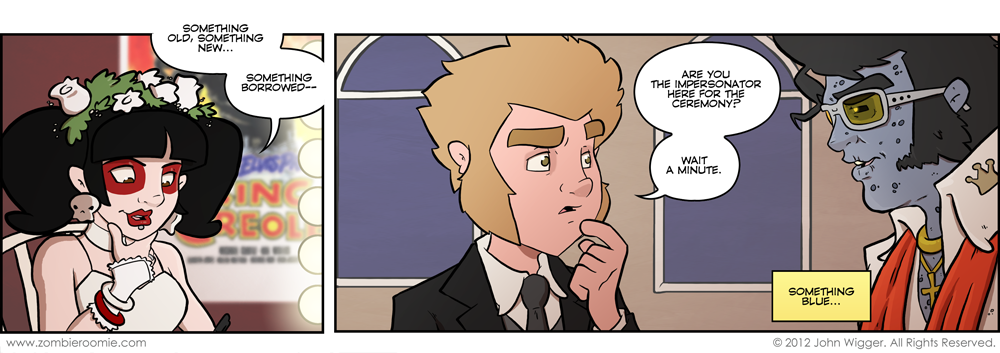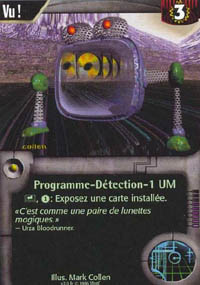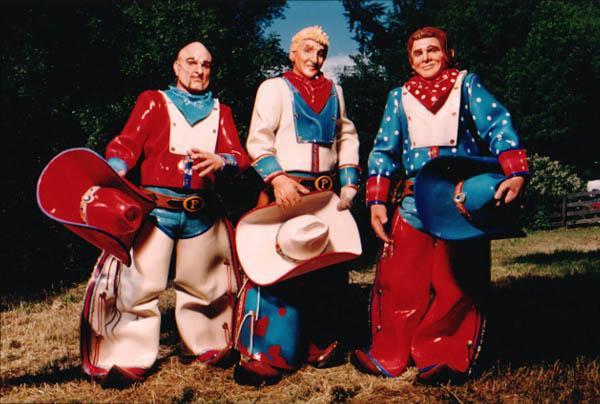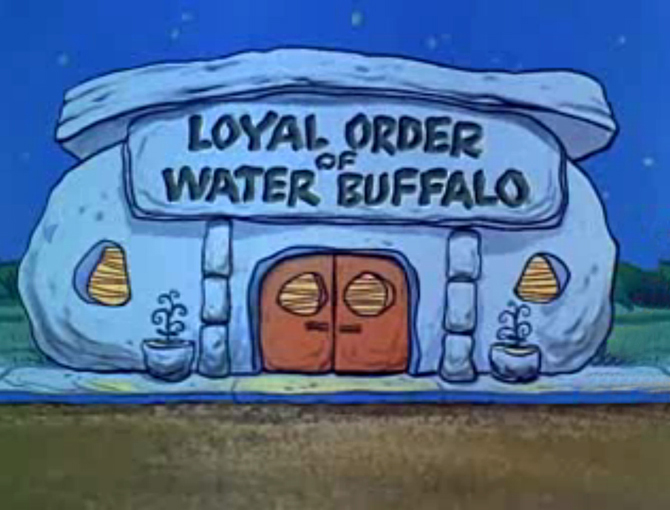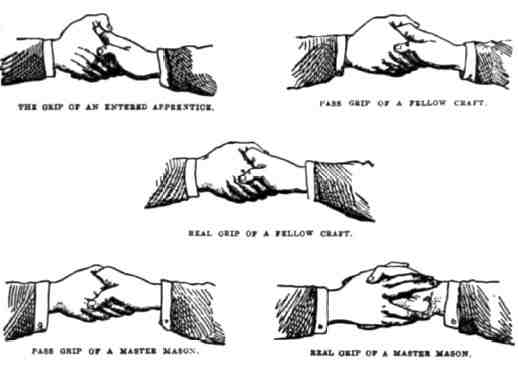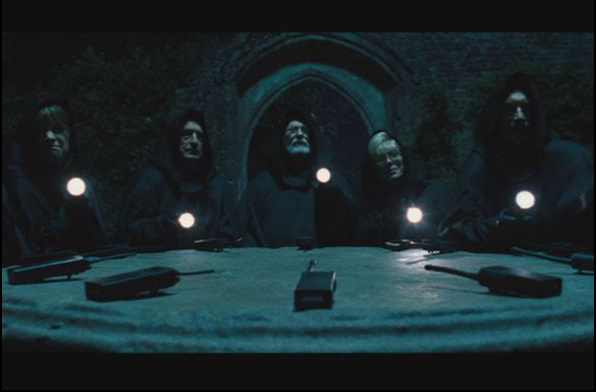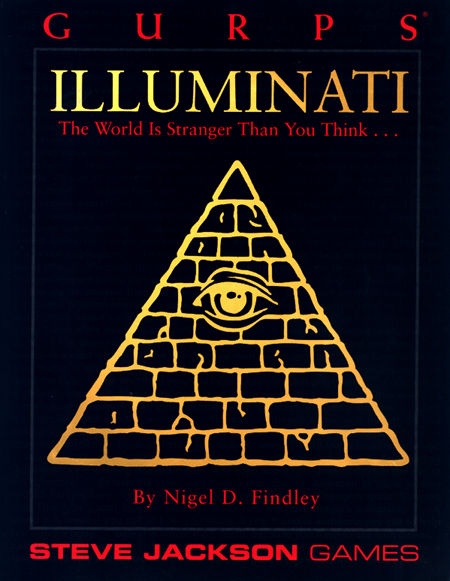
I can't fucking sleep and I feel shitty, so let's review one of the most beloved GURPS books of all time.
This is actually something like the third edition of this book - the first printing came out in '92, and this is the 2000 printing; some of the cartoons are copyrighted back to 1979 which is maybe a good aside to talk about how this book is different from other GURPS books. See, before fourth edition, there was very little connective tissue between the various GURPS setting books - they were designed to be lego sets, but it didn't provide any Lego Movie type narrative for mixing your Lego Batman with Lego Star Wars. You were expected to come up with that shit on your own.
Except, there was the Illuminati. It was not a major element of the game, per se, but it was a core staple of Steve Jackson Games. In 1981 they came out with the standalone card game Illuminati, in 1994 they came out with the collectable card game Illuminati: New World Order, Pyramid magazine takes its name from the Illuminati eye-in-the-pyramid symbol, electronic versions of Illuminati were basically the reason SJG had a BBS for the Secret Service to lose their shit over, and aside from GURPS: Illuminati itself, the book has led directly to GURPS: Illuminati University, GURPS: Warehouse 23, and GURPS: Cabal, among others I'm probably forgetting. There have been electronic versions and board game versions and play-by-mail versions. Illuminati may not be a flagship product along the lines of Munchkin these days, but it has been very good to SJG.

Some or all of the above may be false, at least in your paratimeline.
So, the basics. GURPS: Illuminati is based on the Illuminatus! Trilogy by Robert Anton Wilson and Robert Shea.

If you're not famliar with it, Illuminatus is a trippy, sporadic, light-hearted, drug-and-sex fueled quest through ancient conspiracies, exotic politics, obscure religious cults, magickal workings, and the search for enlightenment. It combines real history and fiction, and while never approaching an Umberto Eco Foucault's Pendulum level of drawing the reader in, it is the epitome of the conspiracy novels, the archetype against which Dan Brown flogs his pathetic little penis and whimpers at the mere mention of it, because he knows he has sinned and is not worthy to be shelved next to it.

Sections of the Illuminatus Trilogy were originated in Wilson's first book, pictured above.
It is also fun. Not fun in the way that Shriners drive around in little cars or fun, or the idea that George Bush is a moron with a 84 IQ who dressed in funny robes and kissed a skull and got spanked in college, but fun in the sense that it was surreal, and people believed in it - all of it. The Illuminati, the Freemasons, Reptilians, Black Helicopters, New World Order, the United Nations, Secret Protocols of the Elders of Zion, the Greys, Roswell, the Kennedy Assassination, the Knights Templar, the Assassins, the Vatican, the International Monetary Fund...

It's all connected.
There's a lot of fun to be had, in piecing together the bits of the puzzle. It's the game-behind-the-game in stuff like The X Files and True Detective and Planetary, it's the appeal of the Cthulhu Mythos and detective fiction, unraveling the mystery - uncovering the conspiracy - one layer, one episode at a time. Never quite knowing what's going but experiencing a series of revelations...
...and it is the kind of thing that games that feature big important conspiracies like Call of Cthulhu and World of Darkness are terribly fucking bad at. CoC and WoD forget that the whole point of conspiracies is the onion; that there is a secret history that the players can uncover and care about. There has to be stakes, the PCs need a place in figuring it out, moving against it, doing shit, but more than that the conspiracy needs to be secretive, complicated, strange, and yet be coherent enough to fit into the backstory and compelling enough to actual have a reason to exist and be of interest to the players. There has to be a bigger picture, and the PCs need to have a piece of it, and want to find out the rest.
Anyway. This book is not your typical GURPS book, because it's a straight setting book. I know that GURPS put out a lot of those, but this book is even moreso, because aside from a couple of statblocks, there's no mechanics in the whole book. It's like if you bought a lego set with no legos. More than that, if you bought a lego set, and there weren't even instructions for building things with legos. Instead, it's like a novel that inspires you to build cryptic structures with your legos.

I either took the lego metaphor too far, or not far enough.
This book was initially written by Nigel Findley, who is mostly known as one of the most beloved authors of Shadowrun, who wrote many classic sourcebooks and adventures, like Tir Tairngire and Harlequin; he's the unofficial saint of the setting because he died young and unexpectedly, so even though he was chin-deep in elfwank by contemporary standards, he gets a pass. But more to the point, Nigel Findley was good at writing RPGs at a time when many people were not, and GURPS Illuminati might be the single best book he ever wrote - it was undoubtedly the most experimental, idiosyncratic, and bizarre RPG book he ever wrote as well, but that might be why it's aged so well an age where fever dreams about black helicopters and freemasons have given way to anti-vaxxers, 9/11 truthers, birthers, and death panel conspiracy theorists.

You knew this was coming up at some point.
But, this isn't just a Nigel D. Findley joint. It was edited by Steve Jackson and Jak Koke, with additional material from Steve Jackson and regular GURPS hack Chris McCubbin, of AutoDuel fame and GURPS CthulhuPunk Infamy. A lot of the cartoons are from infamous science fiction writer and cartoonist Alexis Gilliland, which tells you something about the nature of this beast - it's a labor of love. It's perhaps one of the best GURPS books that has ever been printed, and that's saying a lot, and yet it exists almost entirely outside GURPS. It's just a pure book on conspiracies for your RPG - for any RPG.
Okay, that's the title page. Tomorrow...the introduction!











